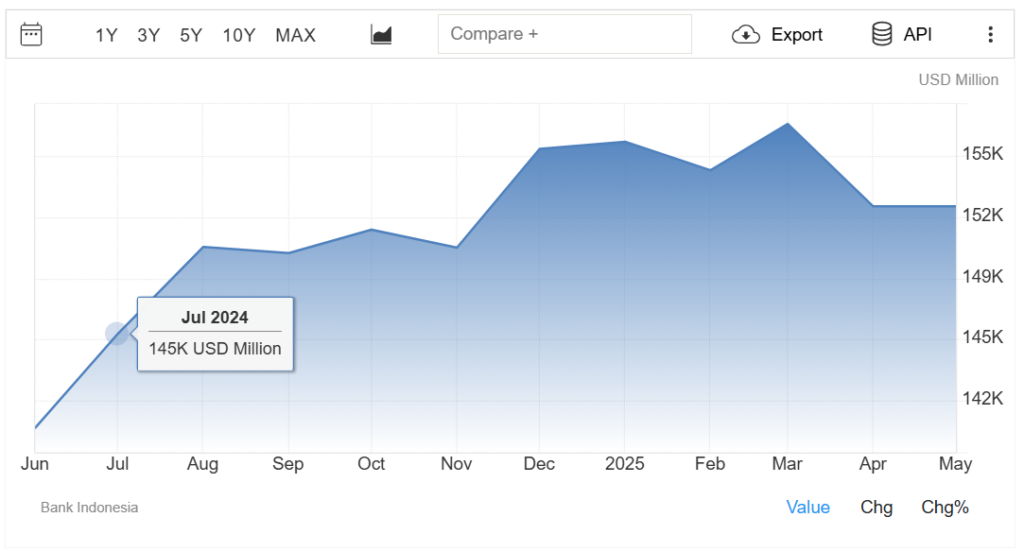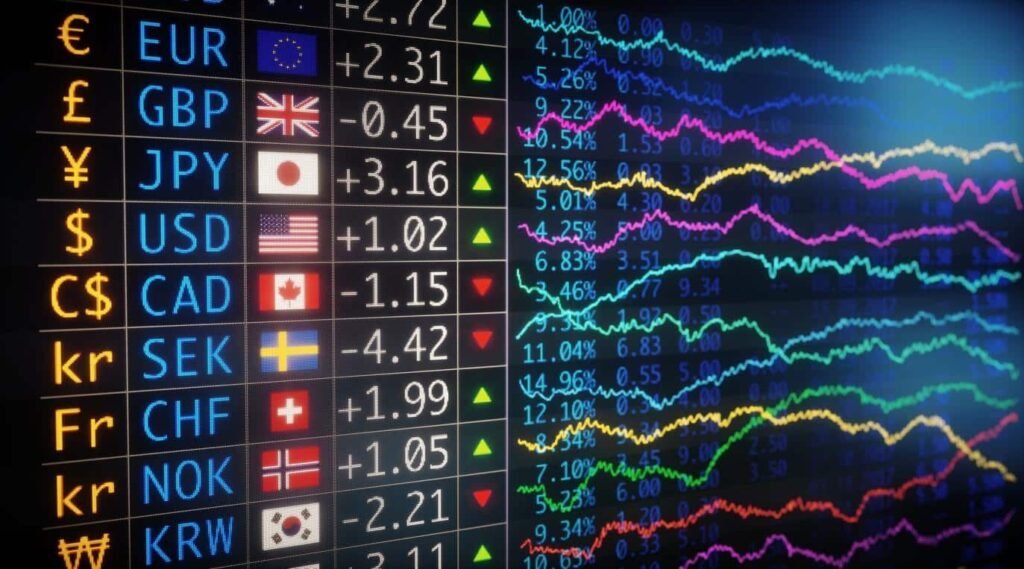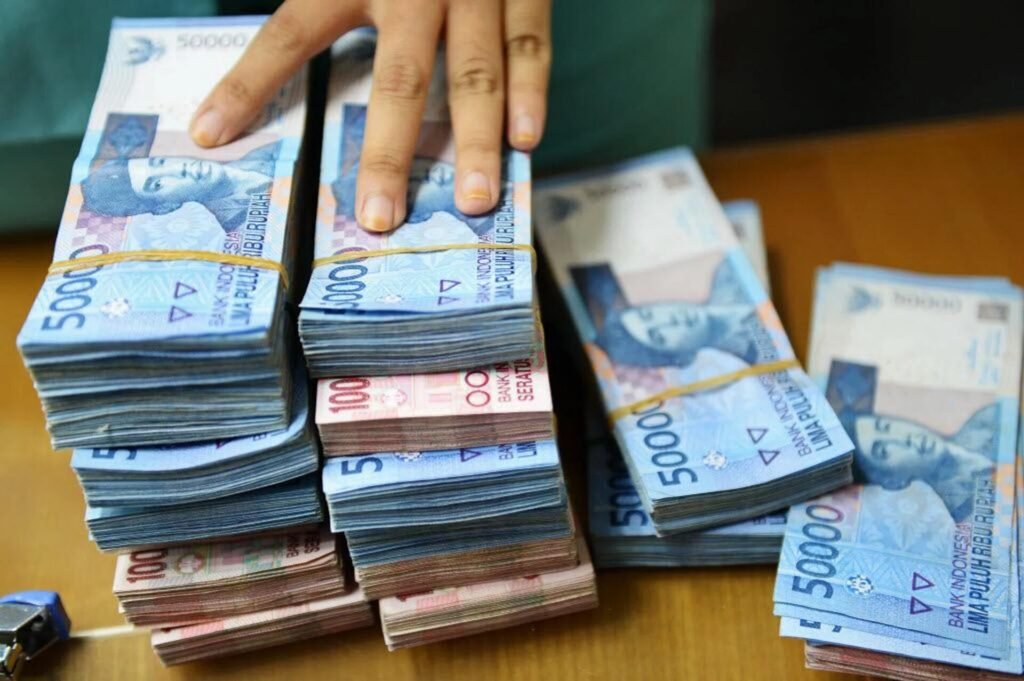
BI forex intervention : Source- TradingEconomics
BI forex intervention refers to the active role Bank Indonesia plays in the foreign exchange market to manage the movement of the rupiah. As we move through 2025, global conditions continue to challenge emerging markets. Tightening monetary policy in the U.S., slower Chinese growth, and rising geopolitical risks have all contributed to currency swings across Asia. For Indonesia, BI’s intervention helps contain excessive volatility—ensuring the rupiah doesn’t fluctuate in a way that would hurt trade or investment. It’s not about fixing the exchange rate but about avoiding panic, overshooting, or distortion in the market.
Why Does Bank Indonesia Intervene in the Forex Market?

Bank Indonesia steps in when currency movements are too sharp, too fast, or misaligned with fundamentals. In 2025, this has been especially important. For instance, in response to global funds exiting emerging markets earlier this year, BI intervened to smooth out depreciation pressure. The central bank’s actions help maintain stability in inflation, preserve purchasing power, and prevent imported price shocks. In that sense, forex intervention works as a shield—protecting the economy from the turbulence that originates beyond Indonesia’s borders.
What Intervention Tools Is Bank Indonesia Using in 2025?

Source: THE BUSINESS TIMES
In 2025, BI uses several key instruments to maintain order in the forex market. Direct market operations—buying or selling U.S. dollars—remain the most visible tool. Additionally, BI deploys domestic non-deliverable forwards (DNDFs), a hedging product that helps stabilize future expectations without disrupting current flows. The bank also actively manages its foreign currency reserves to ensure there’s enough liquidity to meet market demand. These tools, when used in combination, help BI control short-term stress while supporting confidence in the rupiah.
When Does BI Decide to Intervene in the Market?
BI doesn’t intervene constantly—but it acts when necessary. In 2025, interventions have occurred when speculative behavior, external shocks, or sudden capital outflows caused the rupiah to fall beyond acceptable levels. These actions are typically aimed at keeping the market orderly. BI doesn’t always announce its moves, but market participants often recognize its presence through improved liquidity or sudden stabilization. The goal is to prevent self-fulfilling market panic, especially during high-pressure events like central bank decisions or political uncertainty abroad.
How Has BI Forex Intervention Performed in 2025?
So far in 2025, BI forex intervention has helped maintain the rupiah within a relatively stable trading band, even as global factors pressured many regional currencies. This performance has boosted market confidence and supported foreign investment into Indonesian assets. Businesses have also benefited from greater currency predictability—enabling better cost control and pricing strategies. While interventions can’t prevent all movements, BI’s ability to anchor expectations and reduce volatility has been an important pillar of Indonesia’s financial stability this year.
How Transparent Is BI About Its Intervention Approach?

Bank Indonesia is generally cautious in revealing real-time details about its forex operations. In 2025, this approach continues. While BI shares its broader objectives—such as maintaining rupiah stability and managing inflation—it avoids disclosing specific levels, targets, or timing of intervention. This is intentional. Too much transparency can invite speculative behavior or misinterpretation. However, BI remains communicative through regular press briefings, monetary reports, and policy reviews—offering enough insight to guide investor expectations without giving away its strategy.
Is Forex Intervention a Sustainable Strategy for BI?
Intervention is not a permanent solution—it’s a tool to help the economy absorb shocks. In 2025, Bank Indonesia has made it clear that intervention is used to smooth volatility, not to override market forces. Long-term stability still depends on factors like inflation control, sound fiscal management, and resilient exports. BI forex intervention complements these broader efforts, acting as a short-term buffer when markets become dislocated. As such, it remains an important, but not standalone, part of Indonesia’s economic policy toolkit.
How Does This Affect Indonesians on the Ground?
While the average Indonesian may not follow currency charts, the effects of forex volatility are real. When the rupiah weakens suddenly, imported goods—from fuel to smartphones—can become more expensive. In 2025, BI’s interventions have helped reduce these price shocks and support purchasing power. For businesses, a more stable exchange rate means fewer disruptions in planning and production. So while these actions may seem abstract, their purpose is grounded in keeping daily life and the broader economy running smoothly.
Conclusion: Why BI Forex Intervention Remains Vital in 2025
As of 2025, BI forex intervention continues to serve as a stabilizing force in Indonesia’s economy. With global conditions in flux, from interest rate cycles to commodity price swings, Bank Indonesia’s role in managing the rupiah is more critical than ever. Through a mix of direct market action and strategic policy signals, BI ensures that the forex market remains orderly, transparent, and aligned with the country’s broader economic goals. In a world where financial markets react faster than ever, this behind-the-scenes work is essential to keeping Indonesia steady.




